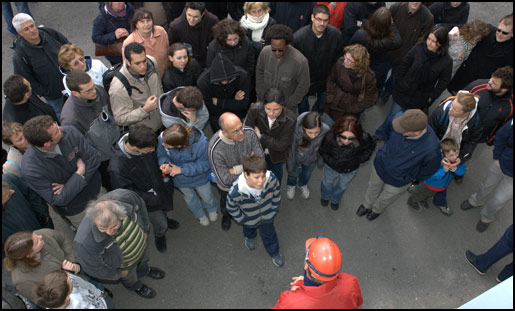
ATLAS e-News
23 February 2011
Public understanding of physics in ATLAS guided tours
5 May 2008

A tour group prepares to visit the ATLAS Detector on the Open Day in early April
There’s no doubt that touring Point 1 is, for many members of the public, the highlight of their visit to CERN. But how much of the physics do they actually understand, and what information do they recall and take away with them? Considering these questions is an important part of the ATLAS outreach strategy, and they are the subject of a new report by researchers from the Institute of Social Sciences and Teaching, at the University of Lausanne.
The study looked at 137 visitors – 72 per cent of whom were men; 25 per cent of whom were women (3 per cent gave no gender information) – and investigated how they interpreted and what they could recall of the information presented to them during their visit. The results indicated that those with higher levels of education, and those with more favourable attitudes towards science in general, were better at recalling the information they had heard, and at giving detailed descriptions of the experiment in their own words. It also found that men were better at doing this than women, but that visitors who had read up on or otherwise researched ATLAS before coming to CERN did not show any significant improvement over those who had not.
Participants were each asked to fill in one questionnaire before their visit, and another following the tour. The first questionnaire probed their views on science, encompassing funding, religion, and the role of scientific research in society. It also established their level of education, field of expertise, and age.
The second questionnaire combined two types of question. One was an open-ended question, in which the attendees were asked to describe, in their own words, the aims of the ATLAS experiment, as if explaining it to a friend or colleague. The rest were fact recollection or inference questions, which either required them to quote a specific fact – such as the length of the accelerator; or to choose from a selection of answers provided – for example, picking out technical terms used in the tours from a list of words like “calorimeter” and “altimeter”. It also asked how interesting the participants had found the tour, and how easy they had found it to understand.
The participants had an average age in the range 30-35; the majority were university educated; and 31.4% of them had religious beliefs. They attained a mean score of 5.32 out of 7 for the question testing their objective knowledge of natural sciences, and reported that they found the tour neither easy nor difficult to understand. Asked whether they found the visit interesting or not, 10.2 per cent of the participants described it has having been “rather interesting”, and 86.1 per cent reported that they had found it “very interesting”.
The study showed that, overall, comprehension of the experiment among the visitors was good, and that they were successful when recalling or inferring the essential terms that were presented to them during the tour. It also indicated that the level of interest in the tour, and its perceived difficulty, had no impact on how well people performed at remembering or describing the information they had heard.
Of course, each tour guide has their own individual style of presenting the relevant information, and the researchers conceded that this is a significant limitation of their study. They also point out that the different guides involved in the research may also have allowed varying amounts of time for participants to fill in their surveys, which may have had an impact on the detail and accuracy of their answers.
Having said this, the findings are still valuable for those at ATLAS involved in the development of future tours. In particular, the researchers suggest that, since favorable attitudes towards science were identified as one of the key factors in the understanding of the experiment, tour guides could improve the communication of the ATLAS message by expanding their talks to encompass the relevance of the ATLAS experiment in society, and even the role of science in society more generally. Something for all the tour guides reading this to think about!
